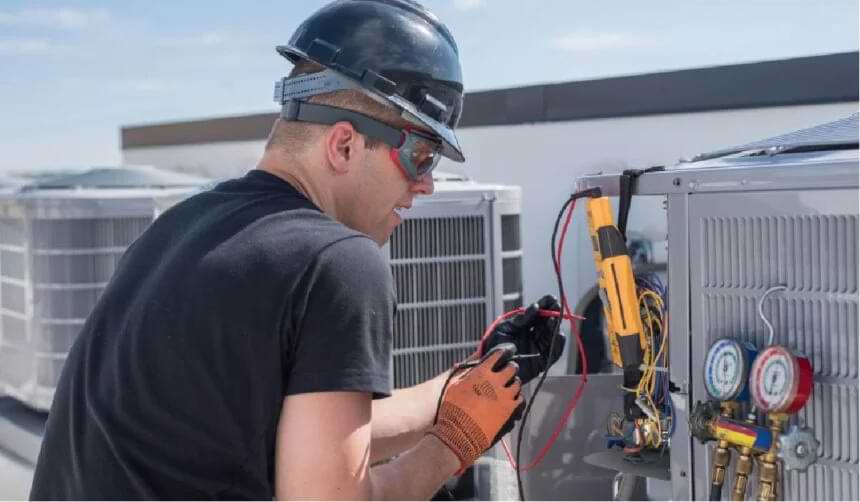Introduction
When your home’s heating or cooling system stops working, your first thought is to get it fixed quickly and at a fair price. While looking for help, you will usually find two types of service providers: a general handyman and a specialized HVAC contractor.
A handyperson may offer a lower hourly rate and more flexible scheduling, which can make them seem like a good choice for minor repairs. However, your HVAC system is one of the most complex, costly, and crucial components of your home. Giving the job to the wrong person can create bigger problems, high expenses, and even serious safety risks.
Knowing the difference between someone who does all types of jobs and someone who is an expert in one field is significant. A handyman is helpful for many household tasks, such as fixing a dripping tap or repairing drywall. Still, they usually do not have specialized training, tools, or licenses required to work safely on heating and cooling systems.
An HVAC contractor, however, is a trained specialist who has dedicated their entire career to focusing solely on this system. This article will explain the significant differences between the two and show why hiring a licensed expert is a must for the safety, efficiency, and comfort of your home.
Training, Certification, and Licensing
The most significant difference between an HVAC contractor and a handyman is their education and official approval. A professional HVAC contractor undergoes years of technical training and hands-on practice, acquiring expertise in cooling systems, electricity, refrigerant handling, and air movement. To legally work, they must also pass strict state or local exams to get licenses, which prove their skills and knowledge of safety rules.
HVAC technicians must also have EPA Section 608 certification to handle refrigerants, which are controlled by law because of their environmental risks. A handyman, in most cases, does not have such licenses. Their knowledge comes from general experience, not from focused study. This lack of proper training means they may not fully understand how modern systems work or how to follow safety rules.
There’s plenty more to explore check out our other posts!
Specialized Tools and Equipment
Fixing an HVAC system needs more than a standard toolbox. Today’s heating and cooling systems are advanced machines that require special diagnostic tools. HVAC contractors utilize professional equipment, including refrigerant leak detectors, combustion analyzers, digital gauges, and thermal cameras.
These tools help them find the exact cause of a problem. For example, a handyperson may assume weak cooling is due to low refrigerant, but a contractor can detect the precise spot of a tiny leak. A handyperson may not find issues with a furnace’s heat exchanger, while a contractor’s analyzer can detect dangerous carbon monoxide leaks. Without the right tools, repairs often turn into guesses, leading to poor results.
Knowledge of Codes and Rules
Installing or repairing HVAC systems is controlled by strict local, state, and federal building codes. These rules are in place for safety, to prevent fires, electrical issues, and leaks of gas or refrigerant. Licensed contractors know these codes well. They also handle permits and make sure their work passes inspection.
A handyman often doesn’t know these detailed requirements. Work done without permits or according to wrong codes can be dangerous and may also cause problems when selling your home. Insurance may not cover damages from unpermitted work, leaving you to pay the full cost later.
Safety and Insurance
Working on HVAC systems is risky because it involves electricity, gas, and high-pressure chemicals. Professional HVAC companies carry liability insurance (to cover accidental damage to your property) and workers’ compensation (to cover technician injuries).
A handyman usually doesn’t carry this type of protection. If they damage your electronics or cause a fire, you may have to pay for it. If they get injured at your home, you could even face a lawsuit. Hiring a licensed, insured contractor protects you and gives peace of mind.
Long-Term Value and Warranties
Although a handyperson may seem cheaper at first, repair mistakes can lead to more significant failures, resulting in costly replacements. Also, most HVAC manufacturers only honor their warranties if licensed professionals do the installation or service. If a handyperson installs a part and it fails, the warranty may be void, and you will have to pay again.
Reputable HVAC contractors also give warranties on their work, meaning if the problem returns within a set time, they fix it for free. This assurance is something you rarely get from handypersons, making professionals a smarter investment.
About HVA Heating & Air
HVA Heating & Air is a trusted team of licensed, certified, and fully insured HVAC professionals. We use the latest tools and keep our training up to date with industry changes and safety codes. We believe in transparent pricing, guaranteed service, and doing the job right the first time, giving you comfort and peace of mind.
Want to learn more? Our full collection of posts is ready for you!
Conclusion:
Handypersons are great for small household tasks, but your HVAC system is too complex and essential to be handled by them. The dangers of poor repair, from safety risks and lost warranties to high long-term costs, are far greater than the short-term savings. For your family’s safety and your system’s longevity, the best choice is clear: always hire a licensed, insured, and trained HVAC contractor.
Frequently Asked Questions
What kind of jobs are best for a handyman?
Handypersons are ideal for minor home repairs, such as painting, assembling furniture, fixing taps, patching drywall, cleaning gutters, and basic carpentry tasks.
Can a handyperson replace my HVAC air filter?
Yes. Changing a standard air filter is a simple task that can be accomplished by a handy person or even by the homeowner. For complex tasks like tune-ups, call a professional.
How do I check if an HVAC contractor is licensed?
Most states have online databases where you can search by license number. Always ask the contractor for their phone number. Honest professionals will share it easily.
My friend is a handyman. Should I let him fix my AC?
Unless your friend has HVAC training and EPA certification, it is risky. For safety and system performance, always hire a certified professional.
Is an HVAC tune-up really for professionals only?
Yes. A tune-up includes checking refrigerants, testing electrical parts, cleaning coils, and calibrating the system. These require special tools and training.




